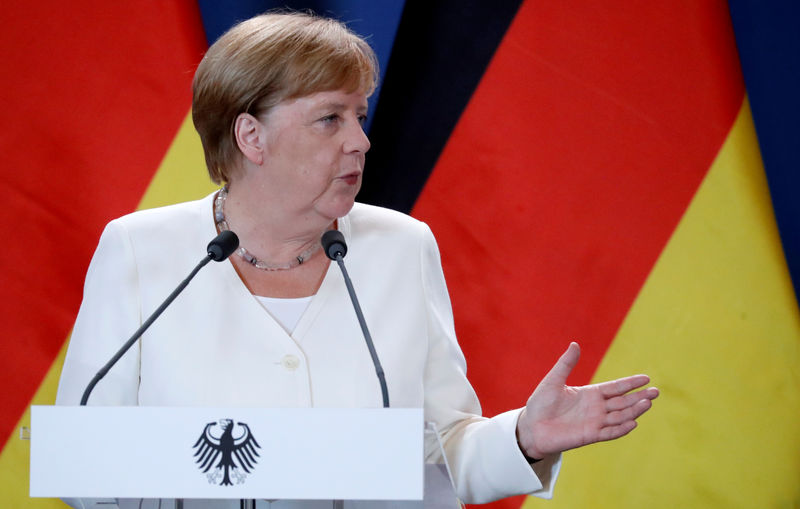By Madeline Chambers
BERLIN (Reuters) - The far right is set to make strong gains in two regional elections in eastern German on Sunday, potentially upending 30 years of rule by the two main parties and hastening the break-up of Chancellor Angela Merkel's national coalition.
The Alternative for Germany (AfD) is harnessing voter anger over refugees and the planned closure of coal mines in the region and cast themselves as the heirs of the demonstrators who brought about the fall of the Berlin Wall three decades ago.
Double-digit gains for the AfD threaten Merkel's conservatives in Saxony and could mean her Social Democrat (SPD) national partners lose power in Brandenburg. The parties have led the respective states since reunification in 1990, mostly in coalitions.
The AfD is expected to take votes from both parties in the elections held two months before Germany marks 30 years since the fall of the Cold War's most potent symbol, the Berlin Wall.
AfD election posters tell voters to "Complete the change started in 1989". With the word "Wende", used to describe the fall of East German Communism, the posters say: "1989 2019. Wende 2.0. Be there when history is made!"
"There is a very broad disillusionment in much of the east with all the established parties and the AfD is dominant as it makes people feel they are being listened to," said Hans Vorlaender, director of a political research centre in Dresden.
The next few months will be crucial if the already rocky national coalition is to survive until a federal election in 2021, with attention on the eastern votes, including a third in Thuringia in October, and on policy.
The parties are due to review the coalition, weakened by rows over migrant policy, tax and pensions, by the end of the year. Many SPD members want to quit an alliance that has kept Merkel in power for 10 of the last 14 years and rebuild in opposition.
A collapse of the coalition could trigger a snap election or result in a minority government - unappealing options for stability-loving Germans. National polls put the conservatives first, with the Greens close behind and the SPD trailing neck and neck with the AfD.
The Greens have also made big gains in both states and may end up coalition kingmaker.
MERKEL LIABILITY?
Heavy losses in state votes last year led Merkel, brought up in East Germany, to quit as CDU leader and announce this would be her last term. The SPD, which rules with the radical Left party in Brandenburg, sank into turmoil after its worst performance in European elections in May, is hovering close to record lows and is still searching for a leader.
"These elections will be catastrophic for the CDU because of the broad appeal of the AfD ... and catastrophic for the Social Democrats (SPD) who are in any case in decline," Nils Diederich, political scientist at Berlin's Free University, said.
A big area of discord within the coalition is a major climate protection package and its financing, with some in the SPD wanting to ditch Germany's long-standing balanced budget policy, an unacceptable prospect to most conservatives even as the economy cools.
The AfD has also sought to attract voters in the poorer East by prioritising coal jobs above the environment.
Germany's cabinet backed a draft law on Wednesday to funnel billions of euros in financial support to regions affected by plans to phase out coal, including Saxony and Brandenburg.
After some 2 trillion euros of transfers from West to East, inequalities persist between the regions, although the gap is narrowing. In 2018, economic output per capita in the East was 81.9% of the national average compared with 103.1% in the West.
It is that sort of statistic that translates into support for the AfD. An Emnid poll in Der Spiegel weekly showed it would win 24% of the vote in the east overall, compared with about 14% nationally.
Polling at 25% in the right-wing bastion of Saxony, cradle of the anti-Islam PEGIDA movement and home to Chemnitz where a year ago Germany's worst right-wing riots in decades took place, the AfD is up from 9.7% in the 2014 state election.
Even if the CDU remains the biggest party, Premier Michael Kretschmer will be weakened and coalition building tricky given his party's antipathy to the Greens, also set for big gains.
Some members of the CDU, currently in coalition with the SPD in Saxony, have flirted with the idea of cooperating with the AfD but Kretschmer, and the federal party, has ruled this out.
"If you vote against Mrs Merkel and 2015 as a protest you won't achieve anything," he has told voters, highlighting how much of a liability Merkel and her open door migrant policy that has brought nearly 2 million migrants, many from the Middle East, to Germany has become.
She has stayed away from the campaign, leaving that to CDU leader Annegret Kramp-Karrenbauer, whose status as Merkel's heir apparent is looking increasingly fragile after several gaffes.

"She is out of her depth and there may be movement among conservatives regarding her after the elections," said Nielsen.